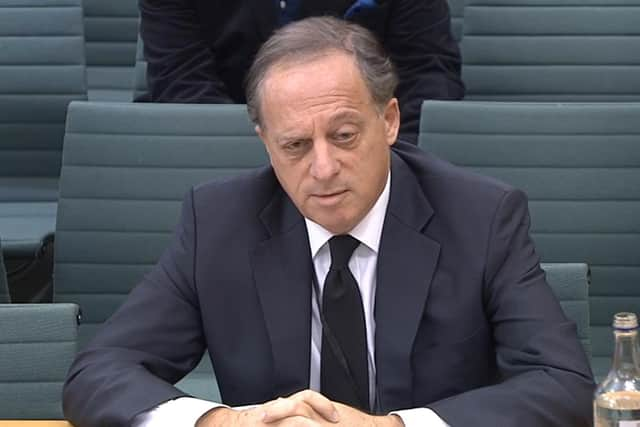Boris Johnson loan scandal: BBC chair Richard Sharp's involvement risks eroding fragile public trust in corporation – Martyn McLaughlin
Those entrusted with the position have been tasked with representing the public interest in the BBC and maintaining its independence. It is an unenviable task, and one made immeasurably more difficult given the influence of the government of the day is never far away.
Questions about political interference over the chairmanship have been ever-present throughout the past century. In 1932, John Henry Whitley, the second man to hold the role, overruled Lord Reith, the director-general, by stepping in to ban the transmission of an interview with Ernst Hashagen, a former German U-boat commander.
Advertisement
Hide AdAdvertisement
Hide AdThe incident badly damaged faith in the young corporation’s independence, and although Whitley caved in to government demands, he felt compelled to write to the Cabinet. “The corporation feels that an incident so contrary to the spirit and intention of the Royal Charter should not pass without protest,” he implored. “The governors venture to assume that it will not form a precedent."


How prescient that missive seems now. The frictions that existed then, and which exposed the uneasy duality of the chair’s position, have shifted in the decades since, but fundamentally, they remain in situ, seeding doubt over who the chair is supposed to serve – a titan of public service broadcasting, or the government which appointed them.
The rapidly unfolding scandal surrounding the incumbent, Richard Sharp, continues this ignominious tradition. Pressure is growing on the 67-year-old to step down after a committee of MPs found he made “significant errors of judgment” by failing to disclose his role in organising an £800,000 loan facility for Boris Johnson, while at the same time applying for the chairmanship.
Mr Sharp has stressed that he did not help arrange a guarantee on the loan, nor give Mr Johnson financial advice, but both are moot points. All that matters is that Mr Sharp chose not to inform the appointment panel or the Westminster digital, culture, media, and sports committee about his involvement in Mr Johnson’s rather chaotic financial arrangements. As the committee’s acting chair, Damian Green, pointed out, the public appointments process can only work effectively if everyone is open and transparent.
The damage this has inflicted on the BBC cannot be understated, especially at a time when the corporation is struggling to retain audience trust. The situation is especially concerning in Scotland, where one in four adults now regards the BBC as ineffective at reflecting people like them, and where the proportion of people accessing its television and online news output is on the wane. As one figure at Pacific Quay put it to me last week: “We’re going to be tarred with Richard Sharp’s brush.”
The corporation has hardly helped itself by announcing that its own nominations committee is looking to ensure that all appropriate guidelines regarding conflicts of interest were followed, but only since Mr Sharp took up his position. But one positive legacy of the latest controversy has been that support for an overhaul of the way the BBC chair is appointed is growing.
Roger Mosey, who spent nearly a quarter of a century at the BBC, serving as its head of news and its editorial director, wrestled for years with the problem of how to bolster public confidence in the institution – not an easy problem to solve, granted, but there is, he now says, an obvious path to progress. “There’s one major step in restoring faith in BBC impartiality and oversight – stop making political appointments to the chairmanship,” he tweeted. “All governments have done it, but it simply shouldn’t happen again.”
Mr Mosey is right. The difficulty, however, is agreeing on what change should look like. The system has been tinkered with repeatedly over the years, and each iteration has invariably failed to nullify concerns about government influence. It was an independent panel, convened under the Nolan principles, which led to the appointment of Gavyn Davies in 2001, in spite of the fact his wife was the private secretary of Gordon Brown, and Mr Davies counted the then Chancellor as a close friend. Under the ill-fated BBC Trust structure, the Cameron government installed Chris Patten, a former Tory minister and chairman of the party, who continued as a business ambassador to the Prime Minister.
Advertisement
Hide AdAdvertisement
Hide AdSo what could be next? Some have proposed that the key BBC appointment could be made by Ofcom, but it seems to me that allowing a regulator to wield such power would merely replace one set of conflicting interests with another. There is an opportunity for a truly independent appointments committee to emerge, but it would only work if it and it alone decided on a shortlist and, ultimately, the successful candidate.
Even then, doubts about the impartiality of members of such a committee seem inevitable; one footnote in the Sharp story that is amusing and exasperating in equal measure is the fact that the advisory assessment panel that approved him as a key candidate included Catherine Baxendale, a Tory donor who was shortlisted as a parliamentary candidate for the party as recently as 2017. She was classed as one of three “independent” directors on the panel.
There is an argument, and one not without merit, that no matter the appointments system that is devised, the tangled connections between those who occupy positions of power and privilege in British life will always produce conflicts of interest. However, that should not derail the journey towards change. If anything is abundantly clear from the furore surrounding Mr Sharp’s appointment, it is that the processes, safeguards, and guidelines in place mean nothing if they can be flouted with such disdain.
Comments
Want to join the conversation? Please or to comment on this article.